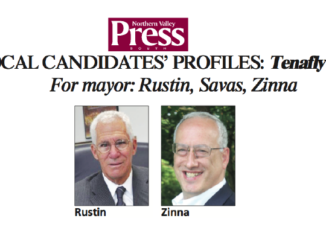
TENAFLY, N.J.—A new pilot program begun in Tenafly’s middle school and high school hopes to reduce stress and anxiety levels—for students and parents—by restricting access to the online grading system during school hours to encourage more offline discussion about grades and student performance.
The program was discussed by several parents Jan. 28 during the “Coffee and Conversation with the Superintendent” event held at the Tenafly Public Schools administration building.
Begun Jan. 27, the plan to restrict access to the district’s Genesis Grade Portal will be in force Monday to Friday 7:50 a.m. to 3:30 p.m., said District Superintendent Shauna DeMarco, to help students and parents to put less pressure on individual grades and look at grades in the overall context of student performance in a particular class.
The program also hopes to aid students to focus on school work during school hours and not focus exclusively on grades, she said.
“Our hope is that closing the portal during school hours will provide students and teachers the opportunity to review student performance together first, before parents get involved, as these conversations may provide important clarification and context. As always, we encourage parents to take an active interest in their child’s performance, and to access the portal as regularly as they feel is necessary—outside of school hours,” said a district email message announcing the program.
The pilot program to restrict access during school hours was begun for four specific reasons, according to the district.
These include: to prevent a student from accessing a grade before the teacher has provided the actual grade to a student, thus not providing any context to student performance; to allow students to “assume primary responsibility” for grades, not parents; to reduce student anxiety over grades, which has reached “epidemic proportions”; and to increase “unfiltered” student-teacher interaction time and encourage students and parents to view grades when together “so that rich, meaningful conversation about the assignments/assessments might take place,” notes the district email.
On Jan. 28, DeMarco told about 20 parents that the pilot program was started based on good word of mouth about similar programs and that the other programs were found to help reduce student and parent anxiety over grades.
When one parent asked about the pilot effort’s genesis, DeMarco noted mental health was partly a concern but the major reason was she had heard positive news about similar efforts, including a recent Wall Street Journal article, which was appended to the email explaining the district’s rationale.
“I want to be very, very honest about this…This is not a reaction to anything, this is not a response to something that is a crisis,” said DeMarco, citing recent articles and academic reports pointing out benefits to limiting access to grade portals during school hours.
‘A little less stressful’
“There are many, many general educational articles that suggest that this could create an environment that is a little less stressful” for students, DeMarco said.
She noted “if we have kids with phones we have some relation to this,” and asked “does this now create an environment where I’m not rushing to my phone checking it?”
DeMarco said the portal restriction was a pilot and would be evaluated based on parent, student and educator comments and input following the program. She told parents “we will reach out for your feedback” before the pilot effort ends.
When one parent asked if the portal could be made available to parents, she said it was also closed to parents so that there would be “no stresses” on students due to parents accessing a student grade during school hours.
Both parents and students can access the portal anytime before or after school hours, DeMarco said.
“We live in an era where anxiety among high school students is reaching epidemic proportions. Two reasons for this phenomenon are excessive academic competitiveness and expectations for immediate gratification. Access to the portal during the school day can exacerbate both problems,” states the district’s email to parents.
“With few exceptions, the school day should provide opportunities for direct, unfiltered teacher-student communication. Parents have ample opportunity outside the school day to discuss their child’s academic performance in its broad contours, rather than simply the most recently posted numerical indicators,” said the email.
In addition, Assistant Superintendent for Curriculum Evelyn Mamman said the district had begun an effort in grade schools toward “matching teachers’ passions” to “a discovery hour” in each school.
Teachers sign up for “discovery stations” that third and fourth grade students can choose to explore, such as chess, cooking, art, and music. She said currently the program is only in elementary grades.
DeMarco started the meeting by showing a video of a college graduation speech, where a Harvard dean listed important questions worth asking such as “Wait, what?” to help get clarity; “Couldn’t we at least?” to search for common ground; and “What truly matters?” to distill the essence.
She said the district is cooperating with a Rutgers University researcher who is conducting “climate surveys” on their school experiences, and the effort will include parental surveys on social-emotional wellness.
She said results will tell “where we’re doing well and where we could be doing better.”



